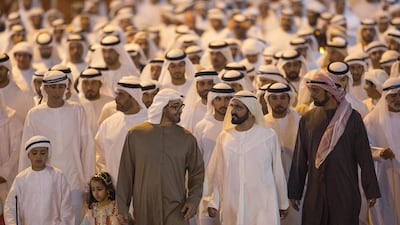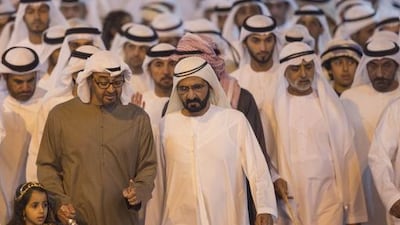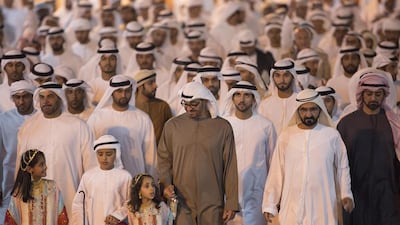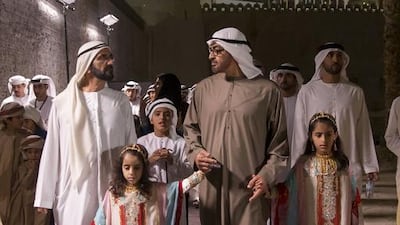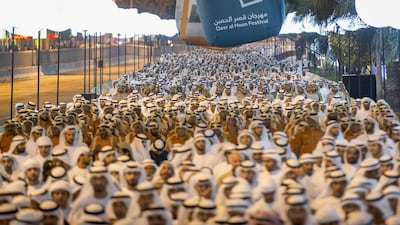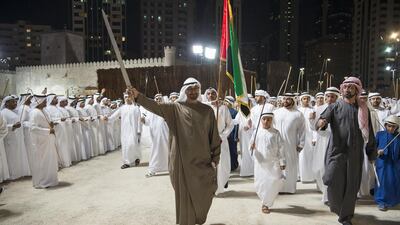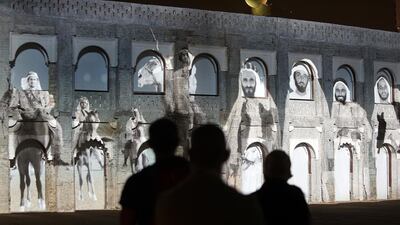ABU DHABI // They marched in their thousands – Royals and notables, soldiers and civilians – drawn to the majestic fort-palace as were their elders decades ago.
Led by Sheikh Mohammed bin Rashid, Vice President and Ruler of Dubai, and Sheikh Mohammed bin Zayed, Crown Prince of Abu Dhabi, the Emirati host walked from Al Manhal Palace to officially open the 2016 Qasr Al Hosn Festival.
The fourth festival, a celebration of Emirati culture and heritage, opened on Wednesday with the traditional march.
“The UAE is proud of its cultural heritage, which we’ll preserve and transfer to future generations to safeguard our authentic Emirati identity,” Sheikh Mohammed bin Zayed, also Deputy Supreme Commander of the Armed Forces, declared on Twitter on Wednesday night.
“We will be loyal to the values of our forefathers, finding inspiration in their glorious history to continue our approach for development. What we live today is a continuation of our past efforts which we are determined to sustain and enhance.”
Inside the fort was as grand a celebration of Arabic culture as you could expect to see as you stepped through the gates and into a distant world.
The festival’s motto, “Take part in history”, delivers every bit of that promise as the first visitors were taken back in time at Wednesday night’s public opening.
Greeted by traditional dancing and the sounds of the ocean lapping against artificial shores in the heart of Abu Dhabi, nationals and visitors realised they were in for something special.
But the 10-day festival is more than a celebration of the past. If not protected and passed on to the next generation, heritage is in danger of being forgotten as it is in any part of the world.
Traditional boat building using palms and coconut husks for bindings, falconry displays to show how the former fathers of the UAE used to hunt, and the impressive history of the capital’s fort in all its restored glory are all lessons there to be learnt.
Abu Dhabi brothers Hamed and Ateeq Al Mazrouei, 18 and 20, said ancient crafts were often discussed in school but seeing them was an altogether different experience.
“To see how our people used to dress and the traditional ways is special,” said Ateeq. “We learn how they used to cook and how they used to live, but to see it and taste it makes it a special experience.”
“It is like going back in time,” said Hamed. “It is different to how we have read in school. Seeing it like this makes our history come alive.”
Visitors can enjoy five zones that characterise Emirati history and culture – Desert, Oasis, Island, Sea and an area dedicated to Qasr Al Hosn.
A museum inside the fort also gives an indication of how the country used to be and how fast it has grown, with photos and scale models. Activities such as shucking oysters, making butter and date palm growth are all interactive lessons.
Other attractions include storytelling, fishing methods, net making and boat building in the marine area. There are four boats on display, each made with a slightly different technique to serve a specific purpose.
The sasha and samash boats are small fishing vessels made from dried-out palm bound together with coconut husk, and are suitable for shallow seas. Long-distance boats such as the dhow and al boom are more sturdy.
Abdulrahman Al Hammadi and Saeed Al Shehhi were given the job of guiding guests on a tour of the Marina side of the Heritage Village.
“We dry the leaves out for three days so they are easier to work with,” said Mr Al Shehhi.
“Then we put the boats in the water for three days minimum, to test them out and make sure they do not sink. This kind of skill has been used for at least 50 years.”
Each of the boats is displayed, with visitors given the chance to help craft the hull of a dhow that is mid-way through construction.
Different materials are used to make some of the boats faster through the water. “Some of boats are only suitable for coastal waters but the bigger boats were often used to travel to other countries,” Mr Al Hammadi said.
Special ropes made of natural fibres are used to bind the boat together, as the material does not rot – “the drier, the better”.
Mr Al Hammadi expressed pride in showing people “how our forefathers once lived and how we have learnt from Sheikh Zayed”, the Founding Father of the UAE.
“They can see how we have come from the past to the present. Our future is only as strong as our foundation, that is our history.
“We still have competitions now to make and race traditional dhows from Abu Dhabi to Ras Al Khaimah. It is an important way to preserve our history for our children.”
nwebster@thenational.ae
